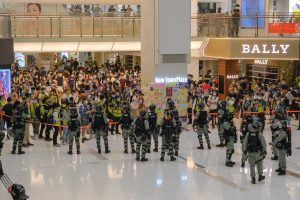Hong Kong police used pepper spray on Friday to disperse over a hundred protesters in a shopping mall who were singing and chanting pro-democracy slogans.
The demonstrators sang the protest anthem “Glory to Hong Kong” and chanted “Glory to Hong Kong, revolution of our times” in the New Town Plaza mall in Hong Kong’s New Territories.
As protesters gathered in the mall, riot police stopped and searched some and later told them to leave, saying they were violating social-distancing rules. The police then sprayed tear gas to disperse the crowd before cordoning off the atrium of the mall.
The protest was one of several that went ahead on May 1, Labor Day, despite rules that forbid public gatherings of more than four people. Small groups of protesters also gathered near Kowloon’s Mong Kok and Kwun Tong subway stations.
Organizers initially planned citywide protests but many were canceled, with the organizers urging people to support pro-democracy restaurants instead.
Friday’s protests were the latest in a string of demonstrations over the past week in which protesters gathered in shopping malls. They follow the arrest of 15 pro-democracy activists and former lawmakers last Saturday.
The demonstrations are a continuation of a movement that began last June to protest an extradition bill that would have allowed detainees in Hong Kong to be transferred to mainland China. Although the bill was later withdrawn, protesters had widened their demands to include full democracy and an independent inquiry into police behavior. The demonstrations continued for months before a lull starting in January as the coronavirus pandemic broke out.
In an earlier protest, demonstrators chanted pro-democracy slogans in another luxury mall in Hong Kong on Wednesday. More than 100 protesters gathered at lunchtime in the Landmark Atrium mall in Central, a prestigious business and retail district, despite social distancing rules that prohibit public gatherings of more than four.
They sang a protest anthem, “Glory to Hong Kong,” and held up signs reading “Free Hong Kong, Revolution Now,” and “Hong Kong Independence.” One protester hung a banner cursing Hong Kong police and their families.
“The protests had calmed down previously because of the coronavirus, but now we must step up and let the world know that we have not given up,” said Mich Chan, who works in the legal industry. “We’re still fighting for what we fought for last year.”
Holding up a sign calling for the movement’s five demands to be met, Chan said she was not worried about possible transmission of the virus during the protests because the people of Hong Kong are “disciplined and know how to protect themselves” by wearing masks.
Police entered the mall about half an hour after the protest began, urging people to leave and warning those assembled that they were violating social distancing rules and participating in an unlawful assembly. The police detained several protesters but later let them go, with no arrests made.
The protest followed similar ones in malls on Sunday and Tuesday in which police dispersed the crowds.
Organizers are planning further protests in May, with an eye to a major march on July 1, the day when Britain returned Hong Kong to China in 1997. Activists expect protesters to return to the streets again, as the city’s daily virus cases have dwindled to single digits for over two weeks.
Adrian Wong, who works in banking, said he came out to protest despite worries about the coronavirus.
“I am concerned about the virus but I think I still have to come out, so that Hong Kong’s people won’t forget what happened in the last year,” Wong said. “The violence of the Hong Kong police force is destroying Hong Kong, and the five demands have not been met yet.”
The protests are also fueled by the perception that mainland China is interfering in Hong Kong’s affairs, after Beijing’s liaison office accused pan-democrat lawmakers of damaging public interest by filibustering and delaying the election of a chairman of the Legislative Council House Committee.
Protesters also criticized the arrests of 15 pro-democracy activists and lawmakers earlier this month on charges of unauthorized assembly during several large-scale demonstrations last year.
“Whether people protest depends on the government’s actions. If the Beijing liaison office continues to criticize lawmakers, disqualify them or even put pressure on people, then people will be angry and come out to protest more eagerly,” activist Ventus Lau said.
By Zen Soo for The Associated Press.
































